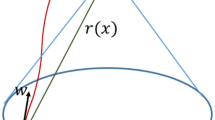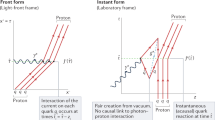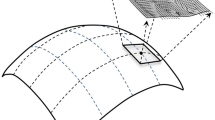Abstract
HERMANN WEYL (Proc. Nat. Acad. of the U.S.A., 15, 323; April 1929) has recently developed a relativistic theory of the Dirac equation which, like that of Wigner (Zeit. f. Phys., 53, 592; 1929), and that of Vallarta and myself (NATURE, Mar. 2, 1929, p. 317), employs the Einstein notion of an ‘n-leg’. Unlike the two other theories, Weyl rejects Einstein's distant parallelism, and obtains a theory invariant under a local rotation varying continuously from point to point. That is, Weyl's theory depends solely on the gλµ's of Einstein's 1916 gravitational theory, and not on the shλ of his 1929 theory. It is perhaps interesting to remark that the same degree of invariance may be obtained by choosing as the 4-legs of the Einstein theory the Ricci principal directions. If we write R—µ for the 1916 contracted curvature tensor, this additional condition is expressed by the formula
This is a preview of subscription content, access via your institution
Access options
Subscribe to this journal
Receive 51 print issues and online access
$199.00 per year
only $3.90 per issue
Buy this article
- Purchase on Springer Link
- Instant access to full article PDF
Prices may be subject to local taxes which are calculated during checkout
Similar content being viewed by others
Author information
Authors and Affiliations
Rights and permissions
About this article
Cite this article
WIENER, N. Dirac Equations and Einstein Theory. Nature 123, 944–945 (1929). https://doi.org/10.1038/123944c0
Issue Date:
DOI: https://doi.org/10.1038/123944c0
This article is cited by
-
Gravitation and Riemannian space
Foundations of Physics (1975)
Comments
By submitting a comment you agree to abide by our Terms and Community Guidelines. If you find something abusive or that does not comply with our terms or guidelines please flag it as inappropriate.



